Suno explained: How to use the viral AI song generator for free
It's time to stage-dive into AI song generators
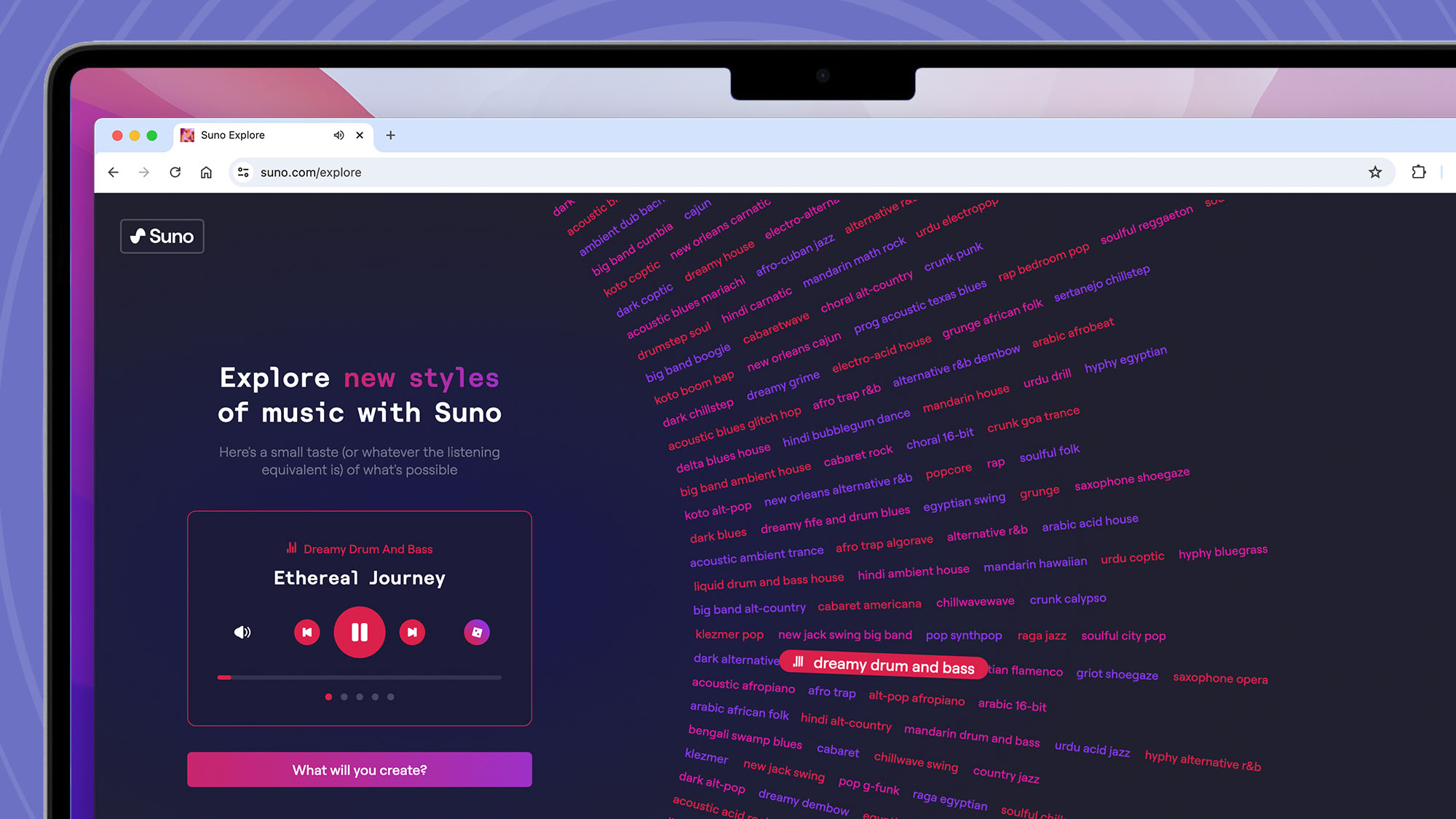
Sign up for breaking news, reviews, opinion, top tech deals, and more.
You are now subscribed
Your newsletter sign-up was successful
Suno AI, or just Suno, is an AI music generator that started to become widely know after December 2023, when it partnered with Microsoft to provide a plugin for Copilot. Since then it has become one of the most sought after AI music generators, thanks to its ability to make song creation as easy as using ChatGPT for text creation.
We've seen AI music generators before, from Adobe's Project Music GenAI to YouTube's Dream Track and Voicify AI (now Jammable). The difference with Suno is that it can create everything, from song lyrics to vocals and instrumentation, from a simple text prompt. You can even steer it towards the precise genre you want, from Delta Blues to electronic chillwave, or even get it to base its music on your own compositions.
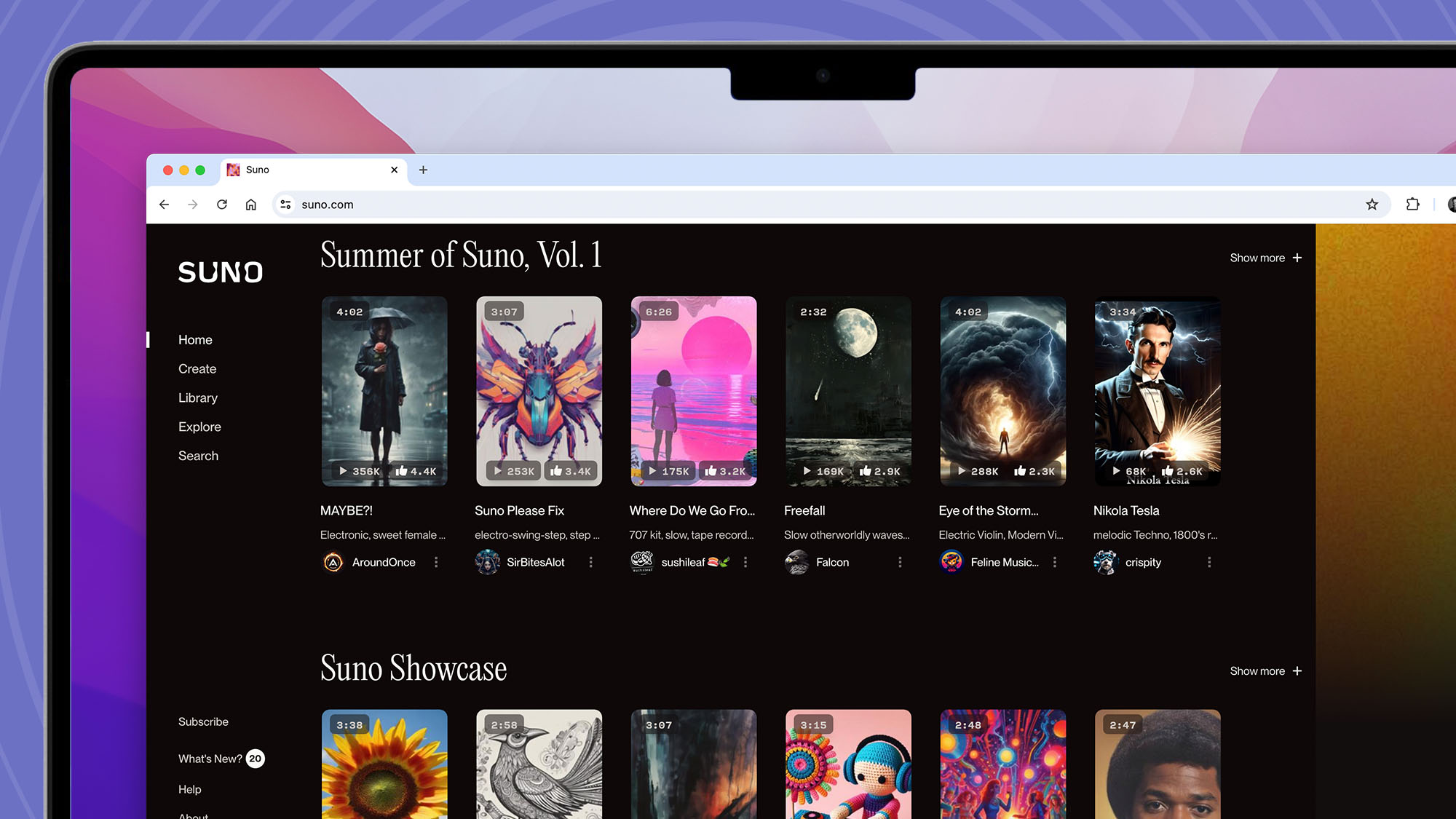
In Suno's latest V4 model (released in November 2024), you can create full four-minute songs, even with a free account. The songs and lyrics are even sharper than in version 3.5. The results can be varied, depending on which genre you choose, but Suno is capable of some seriously impressive results. If you want something more specific, you can upload your own audio clip and get Suno to base its song creation off your own music using its Extend feature.
But how exactly does Suno work, who owns the rights to its generated music, and how can you start making your own robo-rock? We've answered all of this and more so you can stage-dive into the rocking world of AI-generated music…
What is Suno?
Suno is a web and app-based, text-to-music generator that can whip up full songs in seconds from simple text prompts. For example, tell it to make a 'psychedelic UK garage song about a friend with a Nokia obsession', and you'll get a couple of four-minute songs complete with vocals, instrumentation, lyrics, a song title and even artwork.
This is all possible with the free version of Suno, although those accounts naturally come with limitations. You get a maximum of 50 credits per day, which is enough for 10 songs, and then you have to wait until the next day before you can generate any more. You also can't use the songs commercially with a free account, so it's very much for dabbling and or writing ditties for your dog.
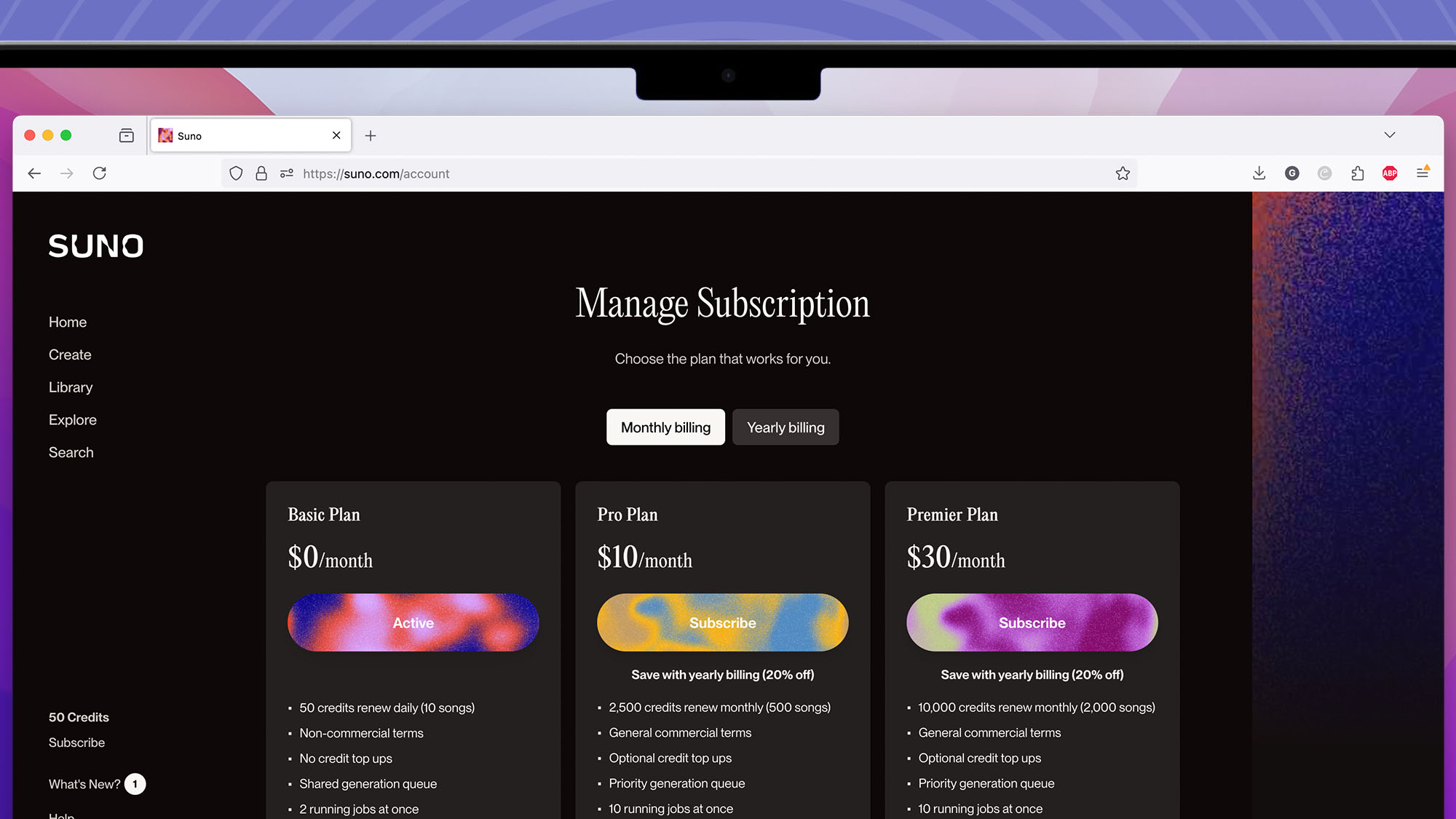
Shell out for the Pro plan ($10 a month, around £8 / AU$15) and you get 2,500 credits a month, enough to generate 500 songs a day. You can also use the songs commercially, for example on YouTube or even by uploading them to Spotify or Apple Music. You also get priority in the song generation queue, meaning you won't have to wait as long for Suno to weave its magic.
Sign up for breaking news, reviews, opinion, top tech deals, and more.
The Premier Plan ($30 a month, around £23 / AU$44) bumps your limit up to a massive 2,000 songs a day (10,000 credits), which makes Bob Dylan look positively lazy. But whichever plan you're on, you get access to all of Suno's tools – including a Custom mode where you write your own lyrics, the ability to upload your own audio (to base the song on) and an Instrumental mode for crafting some new work music.
The superior version 4 of Suno is only available to Pro and Premier subscribers, although a free trial is available.
How does Suno work?
Like most generative AI tools, the precise mechanics of how Suno works are a little hazy, which has lead to at least one lawsuit. It isn't yet clear what data or music the tool has been trained on; we asked Suno for clarification on this and are yet to hear back.
But more broadly, Suno works in a similar way to large language models (LLMs) such as ChatGPT. Lots of training data (which, in Suno's case, includes recordings of speech) help it construct original songs and lyrics based on your prompts. With text, LLMs typically work by predicting what words are most likely to come next in a given sequence, but this is far more challenging for music.
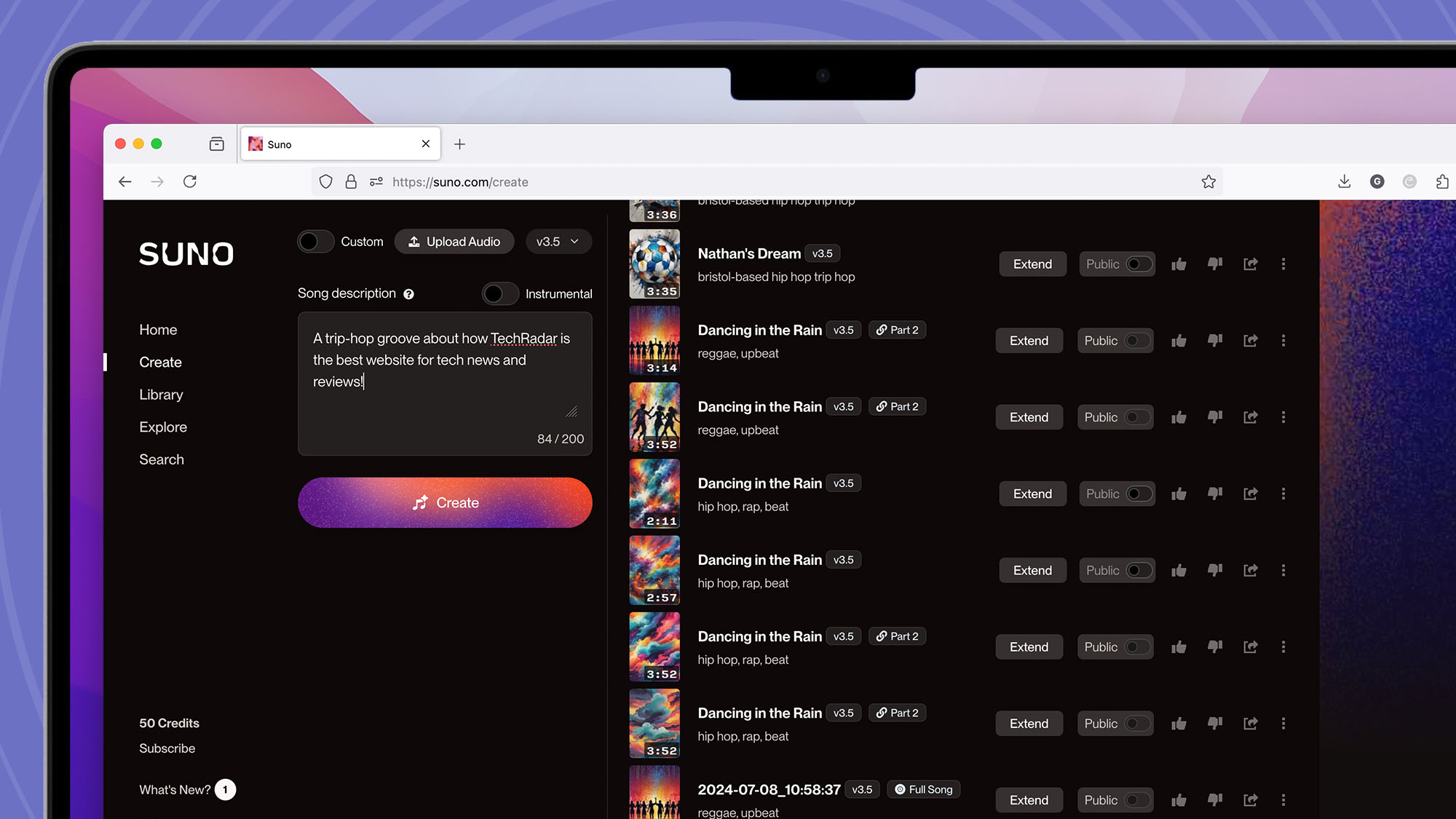
This is why Suno also uses so-called diffusion models (which power the likes of Midjourney) alongside transformer models. In an interview with Lightspeed Venture Partners Suno's CEO and Co-Founder, Mikey Shulman, said: "Not all audio is done with transformers, there's a lot of audio that's done with diffusion – and these two methods have pros and cons."
Whatever the algorithmic rumblings that are going on under Suno's hood, it's one of the best AI music generating engines we've seen (or heard) so far. Sure, the results are heavily compressed and it's stronger at aping some genres than others, but it's also the perfect project for a rainy weekend afternoon.
How do you use Suno?
Suno is ridiculously easy to use – perhaps worryingly so, if you currently make your money from music. Just go to the Suno website, make a free account and head to the 'Create' section to get started.
Here, you'll find a small box to write the description for your song. The main thing to remember is to describe the style of the music you want (in other words, the genre) plus the topic you want the song to be about. You can't ask Suno to write something in the style of a particular artist – which is understandable, as Suno doesn't (yet) have any licenses with labels.
The mobile version of Suno for iOS, and for Android, is even simpler to use, but has fewer features: you type in a prompt saying what the song is about, describe the genre of music you want, give your song a title, then create it and you're done.
We asked Suno to write a TechRadar theme song celebrating gadgets and technology in the genre of electronic chillwave – you can listen to the resulting 'Future frequencies' song below (or by opening the song on Suno, where you can also read its lyrics).
Not bad for a first try. It won't win any Grammys, with its generic EDM synth sound and echoes of The Weeknd, but it's also one of the few times where Suno pronounced the TechRadar name correctly.
Challenging Suno with more stripped-down genres produces slightly more mixed results. Our attempt at making a solo acoustic song about a 'sad AI that yearns to be human' sounds like a robot Phoebe Bridgers who's been forced to write a Eurovision ballad. Suno also really struggled to write a birthday song for our friend in the style of psychedelic '90s rock.
But we have also heard some surprisingly impressive results with blues music – Rolling Stone magazine, for example, managed to whip up a delta blues track called 'Soul of the Machine' (below) that's got nearly 40,000 plays on Soundcloud and sounds very much like a lo-fi recording from the Deep South.
The V3.5 model has "improved song structure and vocal flow", but the latest V4 model improves on that with sharper lyrics and beats, plus Covers – the ability to upload your audio to Suno and get it to do a cover version of your song in a different style – and Personas, which enable you to capture the essence of a track and transfer that style to your next creation.
It's also possible to polish Suno's results using other applications, like Band in a Box, to help improve the sound quality and instrumentation. Just go to the three dots in your song title, then go to 'download' then 'audio' to get your hands on the audio file.
One of the best features of Suno is the ability to extend a song. This means that Suno will analyze a song, then produce more music in the exact same style. You can do this from a song you've already generated (choose 'Extend' from the three dots menu) or you can click on 'Upload Audio' in the Create section and upload some audio to extend the song from. This generates a track with the label 'Part 2' at the end of it. You then need to select 'Get whole song' from the three dots menu to stitch it all together into one track.
You obviously can't monetize the results unless you're on one of the paid plans and you need to attribute the song to Suno as well. Of course, this opens up a bigger discussion about copyright and ownership…
Who owns the songs made with Suno?
The short answer is that you own the songs generated using Suno, as long as you're shelling out for its Pro or Premier plans. If you're a free user, Suno says it retains ownership of the songs you generate.
But this is different from copyright ownership. As Suno's FAQ section says: "the availability and scope of copyright protection for content generated (in whole or in part) using artificial intelligence is a complex and dynamic area of law, which is rapidly evolving and varies among countries".
In the US, for example, creative works that are made by AI without human involvement currently can't be copyrighted. Text-to-music tools such as Suno muddy these waters, though, which is why Suno recommends consulting an attorney if you really need the latest legal guidance on your AI-generated masterpieces.
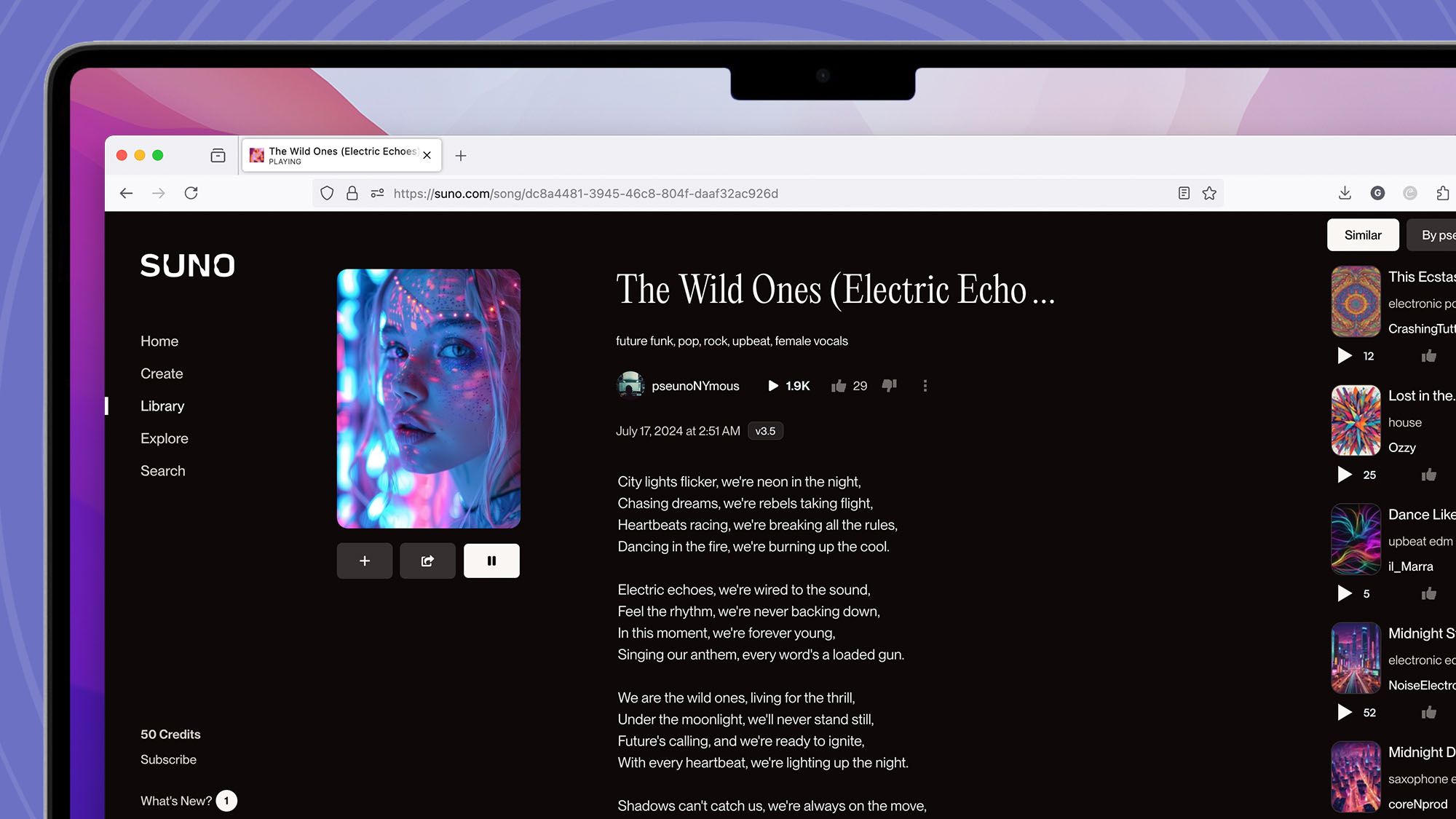
The Recording Industry Association of America (RIAA) and major music labels recently launched a lawsuit against both Suno and Udio for copyright infringement. What this means for the future of AI music generation is unclear. Suno seems to be taking a 'What, me worry?' approach and recently rolled out its mobile app. However, a courtroom showdown could be looming.
You may also remember the viral 'Heart on my sleeve' in May 2023, which was supposedly made by Drake and The Weeknd and which racked up 9 million views on TikTok, before it was revealed that it'd been made with AI by a user called Ghostwriter977. Cue a takedown notice from the artists' record label, Universal Music Group, and a copyright debate that's still rumbling on.
This is why Suno understandably doesn't let you ask it to generate songs in the style of specific artists or use real artists' voices. This area is very much a case of 'watch this space' (while wearing a large pair of the best noise-cancelling headphones, if you're Suno).
What's next for Suno?
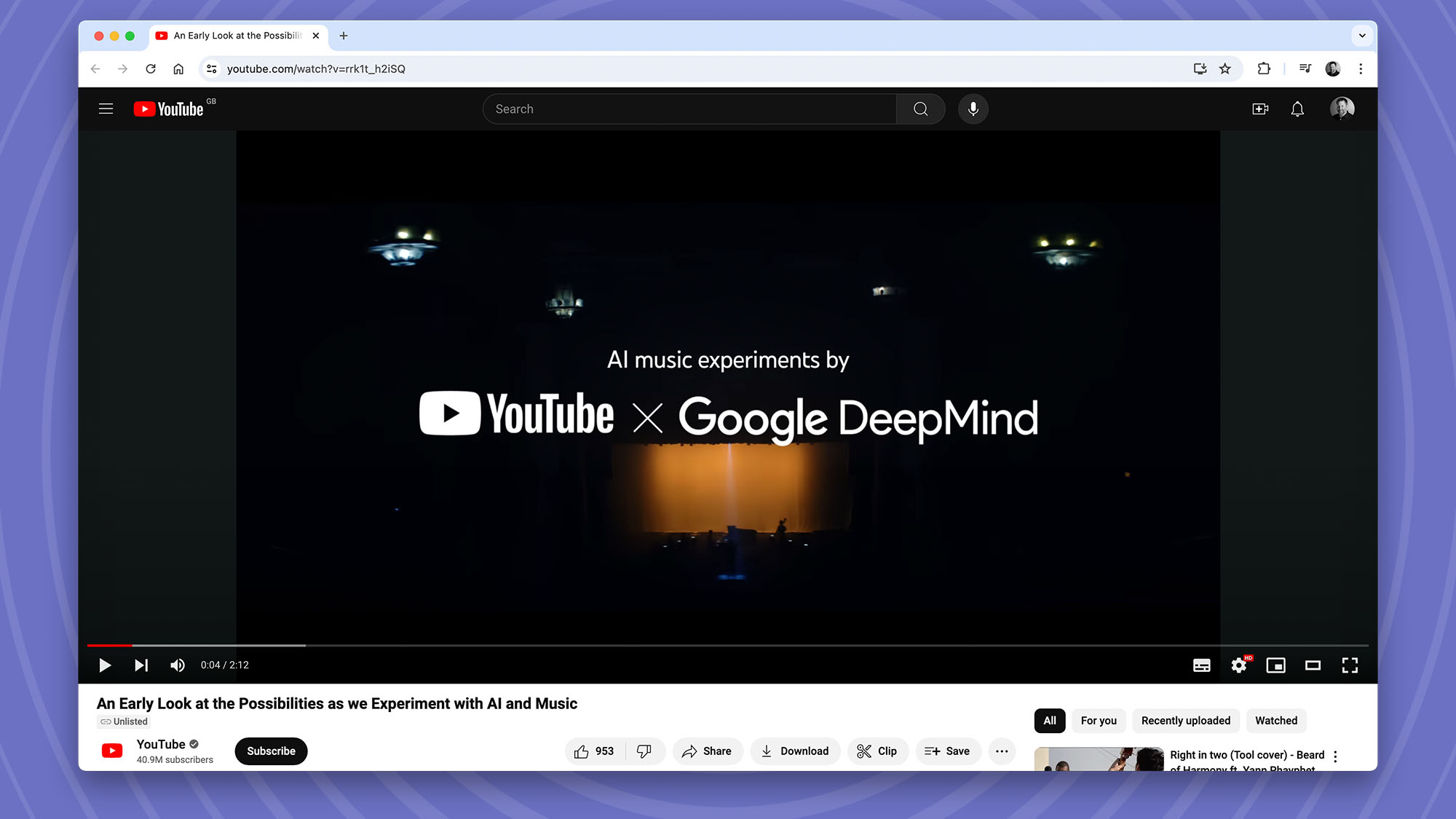
A glimpse of where Suno could be going is Google's Dream Track, which has collaborated with artists to allow its small number of early users to generate AI soundtracks for their YouTube Shorts.
If Suno gets the music labels on board, it could use your favorite artist as a spark to create a new AI-generated track in their style. As Suno's CEO Mikey Shulman said in an interview with Lightspeed Venture Partners: "Let's fast forward a few years to where the licensing climate is a little less uncertain, maybe we can let you prompt the model with a Taylor Swift song."
The idea would be for you to pay an artist in a similar way to how sampling works now – only you'd instead be using their music as a template for a new AI-generated track.
But it's still very early days – and with those licensing issues a long way from being ironed out, Suno is currently more a fun way to create an original birthday song for your friend rather than a fully-blown robot musician.
It also has plenty of competition from the likes of Google, Adobe and OpenAI. For now, though, Suno is one of the best tools we've tried for making AI songs, and with V5 on the horizon, we're looking forward to seeing how it evolves.
You might also like

Mark is TechRadar's Senior news editor. Having worked in tech journalism for a ludicrous 17 years, Mark is now attempting to break the world record for the number of camera bags hoarded by one person. He was previously Cameras Editor at both TechRadar and Trusted Reviews, Acting editor on Stuff.tv, as well as Features editor and Reviews editor on Stuff magazine. As a freelancer, he's contributed to titles including The Sunday Times, FourFourTwo and Arena. And in a former life, he also won The Daily Telegraph's Young Sportswriter of the Year. But that was before he discovered the strange joys of getting up at 4am for a photo shoot in London's Square Mile.
- Graham BarlowSenior Editor, AI
You must confirm your public display name before commenting
Please logout and then login again, you will then be prompted to enter your display name.